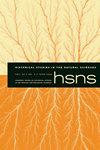The Politics of Early Programming Languages
IF 0.3
3区 哲学
Q2 HISTORY & PHILOSOPHY OF SCIENCE
引用次数: 0
Abstract
There probably has never been such a controversial programming language as Algol. In the early 1960s the disciplinary success of the so-called Algol project in helping to forge the discipline of computer science was not matched by a significant adoption of the Algol language, in any of its three versions. This contrast is even more striking when considering the contemporary success of IBM’s Fortran, a language that, like Algol, was also conceived for scientific computation, but unlike Algol, initially only available for IBM computers. Through extensive archival research, this article shows how the relentless pursuit of a still better language that came to dominate the agenda of the Algol project brought to the fore the tension between the research-driven dimension of the project and the goal of developing a reliable programming language. Such a strong research-oriented agenda increased IBM’s doubts about a project that the firm already felt little urge to support. Yet IBM did not want to appear as obstructing the development of either Algol or Cobol, even if these “common languages” posed a clear risk to the firm’s marketing model. The US Department of Defense’s endorsement of Cobol and the rising popularity of Algol in Europe convinced IBM to push for the use of Fortran in Western Europe in order to protect the domestic market. IBM’s action in support of Fortran reminds us of the power imbalances that have shaped computer science.早期编程语言的政治
可能从来没有像Algol这样有争议的编程语言。在20世纪60年代早期,所谓的Algol项目在帮助建立计算机科学学科方面取得了学科上的成功,而Algol语言的三个版本中的任何一个都没有得到广泛的采用。当考虑到IBM的Fortran语言在当代取得的成功时,这种对比就更加明显了。Fortran语言和Algol语言一样,也是为科学计算而设计的,但与Algol语言不同的是,它最初只适用于IBM计算机。通过大量的档案研究,本文展示了对更好的语言的不懈追求是如何成为Algol项目议程的主导,这使项目的研究驱动维度与开发可靠编程语言的目标之间的紧张关系变得突出。如此强烈的以研究为导向的议程增加了IBM对这个项目的疑虑,而该公司本来就没有什么支持的冲动。然而,IBM并不想阻碍Algol或Cobol的发展,即使这些“通用语言”对公司的营销模式构成了明显的风险。美国国防部对Cobol语言的认可以及Algol语言在欧洲的日益普及,促使IBM在西欧推动使用Fortran语言,以保护其国内市场。IBM支持Fortran的行动提醒我们,影响计算机科学的力量不平衡。
本文章由计算机程序翻译,如有差异,请以英文原文为准。
求助全文
约1分钟内获得全文
求助全文
来源期刊

Historical Studies in the Natural Sciences
社会科学-科学史与科学哲学
CiteScore
1.00
自引率
0.00%
发文量
24
审稿时长
>12 weeks
期刊介绍:
Explore the fascinating world of Historical Studies in the Natural Sciences, a journal that reveals the history of science as it has developed since the 18th century. HSNS offers in-depth articles on a wide range of scientific fields, their social and cultural histories and supporting institutions, including astronomy, geology, physics, genetics, natural history, chemistry, meteorology, and molecular biology. Widely regarded as a leading journal in the historiography of science and technology, HSNS increased its publication to five times per year in 2012 to expand its roster of pioneering articles and notable reviews by the most influential writers in the field.
 求助内容:
求助内容: 应助结果提醒方式:
应助结果提醒方式:


